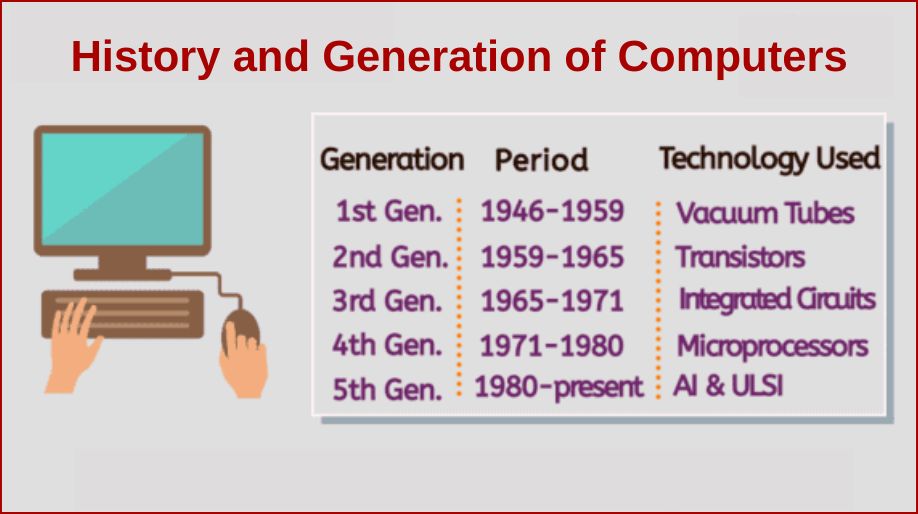Over the
past several decades, computers have revolutionized the way we live our lives. From the first generation of computers to the current sixth generation of computers, technology has advanced rapidly and drastically changed the way we work, play and communicate. With each new generation of computer technology, comes faster speeds and greater capabilities that make life easier for everyone. This article will explore what each generation of computer has offered us and how it affects our lives today.
From the first computers of the 1940s to today’s modern machines, the field of computing has come an incredibly long way. Computers have become an integral part of our lives and can be found everywhere from our offices to our homes. As technology continues to evolve, so too do the generations of computers. Understanding each generation is important for anyone interested in learning about computers and their history.
What is 1st 2nd 3rd 4th 5th generation of computer?
From the first computers in the 1940s to today’s powerful machines, technology has made tremendous advances throughout the last century. This article will discuss the five generations of computers and how each has brought about major changes in technology. Each generation is marked by a major technological advancement that revolutionized how computer systems operate. Understanding the differences between each generation can help one gain better insight into how far computing technology has come and where it might be headed in the future.
The advancement of technology has created several generations of computers that have enabled us to do many things that were once thought impossible. From the first generation of computers, which relied on vacuum tubes and magnetic drums for data storage, to the most recent fifth generation, which uses artificial intelligence, each generation has been vastly different from the one before it. In this article, we will discuss what each generation of computer is, how they differ from each other, and what advances in technology led to their creation.
What are the 5 types of computer generation and their characteristics?
Computer technology has come a long way since its inception in the 1940s. The evolution of computer technology is typically divided into five distinct generations, each with its own set of characteristics and features that have enabled faster computing speeds and more efficient use of data. In this article, we will explore the five types of computer generation and their respective characteristics. We’ll look at how each generation has built upon the previous one to deliver even greater performance and capabilities.
Computer technology has been advancing rapidly since its invention. With each new generation of computers, we’ve seen faster processing power, better storage options, and increased accessibility. In this article, we’ll explore the five main generations of computer technology and discuss their defining characteristics. We’ll start by looking at the first generation computers of the 1940s and 1950s, exploring their basic design and use cases.
What is 7th generation of computer?
The seventh generation of computers is the latest in a series of advancements in technology. Over the past 60 years, computers have come a long way from their first iteration and continue to evolve. The 7th generation is characterized by its ability to handle large amounts of data with greater speed and accuracy than ever before. This generation has seen significant improvements in energy efficiency, portability, and artificial intelligence capabilities.
The 7th generation of computers is a relatively new concept in the world of technology. It refers to the current wave of computing hardware and software advancements that are transforming the way we work, learn and play. This generation has been marked by unprecedented leaps in digital progress, from increased internet access to powerful mobile devices that can do almost anything. In this article, we will explore what the 7th generation of computers is, how it differs from past generations, and its potential impact on our lives.
How many generations of computer are there?
Technology has come a long way in the past few decades. Today, nearly every aspect of our lives is heavily influenced by computers and computer-related technology, but how many generations of computer are there? In this article, we will discuss the history and development of computers, from their humble beginnings up to the present day. We will look at how computing power has grown exponentially over time and explore the various generations of computers that have been released since their introduction.
Computer technology has come a long way in the last few decades, and it’s no wonder that people are curious to understand just how many generations of computer have been released. It can be difficult to keep track of all the different hardware and software upgrades, but understanding the various generations can provide a greater appreciation for how far we’ve come. This article will provide an overview of the main generations of computers, explain their defining features, and discuss how they’ve evolved over time.
What is time period?
Time has been a mystery to many people throughout history. It is an elusive concept that has been studied for centuries and yet it remains a source of confusion to this day. Time period is an important element in understanding the passage of time, but what exactly does it encompass? In this article, we will delve into the meaning of time period and explore its significance in our daily lives. We will examine how time periods are used to structure events and analyse their impact on our behaviours.
Time is a concept that has been around since the dawn of civilization. It’s impossible to imagine life without it, yet many people don’t understand what it really means. In this article, we will explore the concept of time period, the different types available and how to use them effectively in everyday life. We will also discuss some of the common misconceptions about time period and why it is important to understand its nuances.
